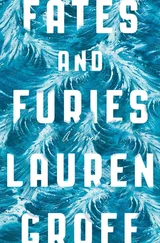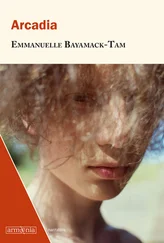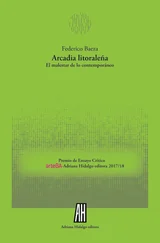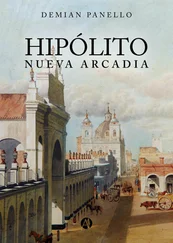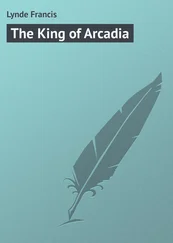Hm, is all she says.
He watches her, amazed. I’m not lying, he says.
I didn’t say you were, she says. Just, how fantastic it seems. I mean, she was precisely the opposite of everything you were. A witch, magical. Old, self-sufficient, with a pet. You were tiny, overwhelmed with community, longing for a woman to take you in. It’s interesting. She shrugs.
You think Verda was an imaginary friend, Bit says, laughing with dismay.
This place looks like it’s been abandoned for centuries, Dad. But whatever. It doesn’t matter. You found what you needed when you needed it, she says, and squeezes his knee.
She has more of a shell than he ever will. Already, she watches life from a good distance. This is a gift he has given her.
Peace, he knows, can be shattered in a million variations: great visions of the end, a rain of ash, a disease on the wind, a blast in the distance, the sun dying like a kerosene lamp clicked off. And in smaller ways: an overheard remark, his daughter’s sour mood, his own body faltering. There’s no use in anticipating the mode. He will wait for the hushed spaces in life, for Ellis’s snore in the dark, for Grete’s stealth kiss, for the warm light inside the gallery, his images on the wall broken beyond beauty into blisters and fragments, returning in the eye to beauty again. The voices of women at night on the street, laughing; he has always loved the voices of women. Pay attention, he thinks. Not to the grand gesture, but to the passing breath.
He sits. He lets the afternoon sink in. The sweetness of the soil rises to him. A squirrel scolds from high in a tree. The city is still far away, full of good people going home. In this moment that blooms and fades as it passes, he is enough, and all is well in the world.
My gratitude goes to everyone who gave me shelter during the long development of Arcadia : to all at Hyperion, especially Barbara Jones, Elisabeth Dyssegaard, Claire McKean, and Ellen Archer; to Jason Arthur at William Heinemann and Stephanie Sweeney at Windmill in the UK; and to Mathilde Bach and Carine Chichereau at Editions Plon in France. To my dashing agent, Bill Clegg, for his honesty, patience, and kindness, and to his assistant, Shaun Dolan. To Erika Rix, who gave me her hours. To those who provided physical space for writing: the Groffs, the Kallmans, the Drummonds, the Peddies, the Herndons, the McKune-Parrishes, and Hannah Judy Gretz and Ragdale for the lovely fellowship. To the Bread Loaf Writers’ Conference and the MFA program in creative writing at Queens University — Charlotte. To my readers: Sarah Groff, Steph Bedford, Kevin A. González, Jaime Muehl, Ashley Warlick, James Willett, and Lucy Schaeffer. To my family, friends, and the authors of the many beloved books that made this novel richer: you are too numerous to list, but I thank you.
Above all, I am grateful for my household of boys: Clay, my bedrock, and my two sons. This book is for Beck, who taught me how great-hearted little boys can be.
The background for Lauren Groff’s sweeping second novel is Arcadia, a utopian commune in upstate New York. Formed in the 1960s by a small enclave sleeping in old buses and lean-tos far from the political turbulence of the era, it evolves and expands over time until its ideals and integrity are challenged by great swells in population, emergent personal desires and agendas, and, eventually, a new generation of Free People.
At the center of all this is Bit, whom we follow from his birth as the Littlest Bit of a Hippie, barely three pounds resting in the local market’s produce scale, through his adolescence in Arcadia, to well into his adulthood, when he struggles with the disappearance of his wife, the complex and slow death of his mother, and his responsibilities as the single father of a teenage daughter, Grete. He also must wrestle with the issue of whether to make a more modern life in the city — teaching photography, making art, and maintaining for his daughter the contemporary life she desires — or to return to the simple, protected land and lifestyle of his youth in the face of a pandemic.
Arcadia introduces us to all kinds of odd and interesting people and provides an emotional exploration of the ever-human challenges of family, personal identity, social organization, and our relationship to the natural world. In its beautiful and quiet way, it stirs us to ask weighty questions about the best way to live, about our relationships with others, about the arc of life. It also constantly reminds us of our potential as human beings for strength, wonder, and grace.
1. Thinking of Arcadia at its best moments, which of its values and tenets seem healthy and important for an individual? For a social group?
2. What are the potential threats — from within the organization and without — to such a communal social structure? How might these be guarded against or managed?
3. What’s healthy or not for children being raised in an environment such as Arcadia? Consider the different ways Bit and Helle think about their upbringing.
4. As a young man, Bit quotes George Eliot’s statement “That by desiring what is perfectly good, even when we don’t quite know what it is. . we are part of the divine power against evil.” Where can you find examples of this being put into action in the novel? What might this mean for your own life?
5. Why is private property not allowed in Arcadia? What effect do you think this has on the identities of those living or raised there? How much of your identity comes from things you’ve purchased? What elements of your identity are independent of what you own?
6. Midway through the story, there is a confrontation between Handy, Arcadia’s founder, and Abe, one of its leaders. How are these two men different? In what ways are they successful or failed leaders? To what extent does someone’s personal or private life affect his or her ability to lead?
7. Consider the long span of Hannah’s life. What have been her strengths and weaknesses as a member of Arcadia? As a wife? Does her admission to Abe that he always gets what he wants, for example, suggest strength or dependency?
8. What has Hannah been like as a mother to Bit? What healthy and positive effects has she had on his growth and development? What qualities does he possess as a man or a father that we can attribute to Hannah? Late in the novel, Bit confronts his mother about the profound difficulties her depression caused him as a boy. What were the long-term effects of this on the kind of person Bit becomes?
9. Consider the various uses of pharmaceuticals and other drugs in the novel: the Trippies’ permanent damage due to LSD; marijuana as recreation or economic crop; the medication that Hannah is on most of her adult life to adjust the “brain chemistry” that causes her depression. How do we determine which are healthy and which are not? What do you make of Abe’s statement that growing marijuana to raise money is “not legal” but not necessarily wrong either?
10. One of Bit’s responses to his mother’s deep depression is to decide he needs a Quest. How does that idea serve him? Real or imagined, how might a Quest be psychologically important or effective as a response to emotional difficulty?
11. Verda plays a significant role in Bit’s life, first as the seeming focus of his Quest, as the old, magical witch in the woods who might give the “curse or antidote” to help his mother. Soon, though, she becomes someone Bit visits and needs in a more realistic way. What does she offer him that is so valuable? In what ways is she different from many of the women in the novel?
Читать дальше
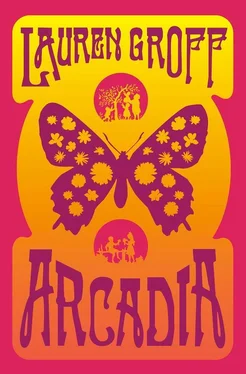
![Andrea Höst - In Arcadia [Touchstone - Extras]](/books/56405/andrea-host-in-arcadia-touchstone-extras-thumb.webp)

